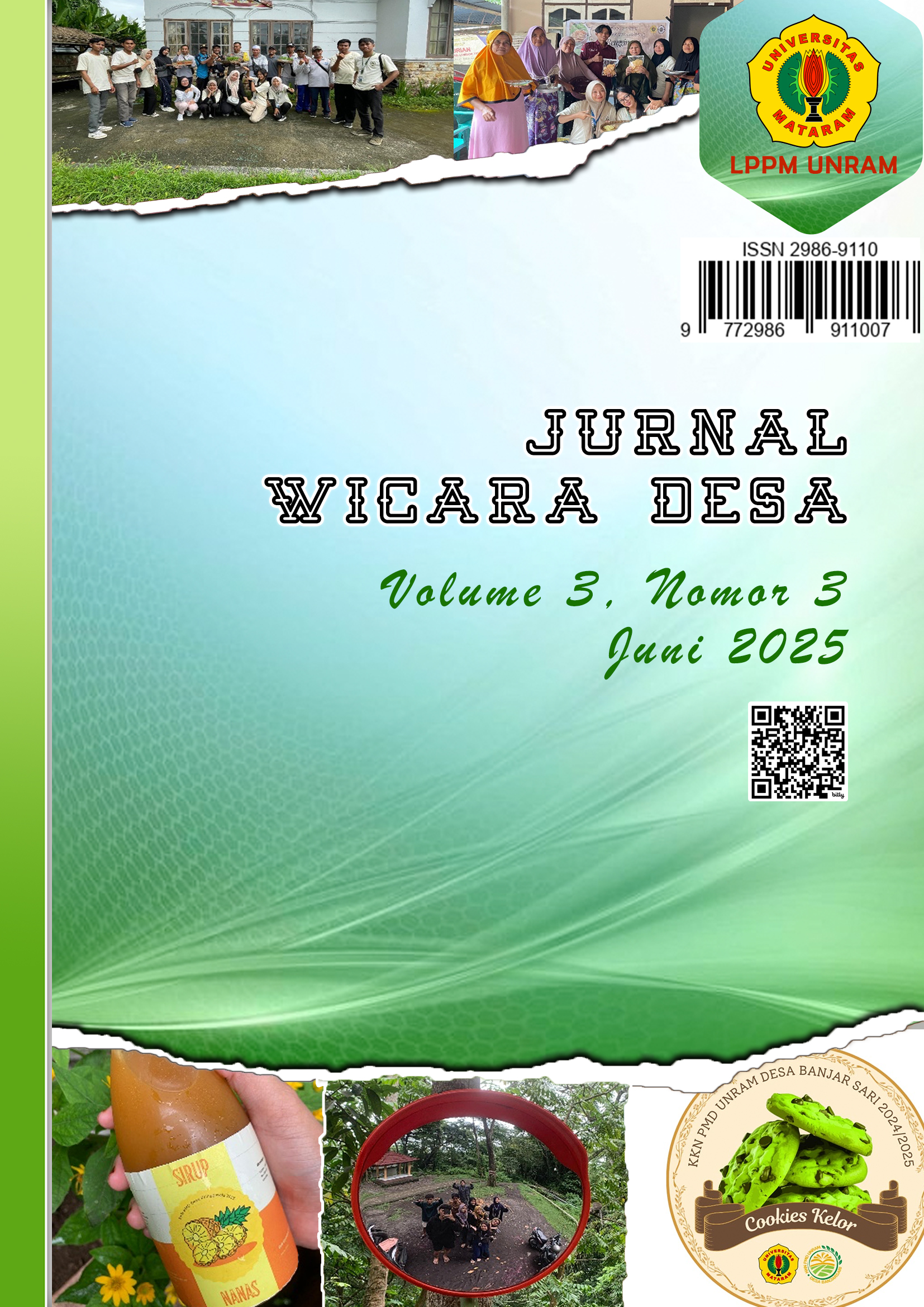Community Empowerment in Processing Chicken Kohe as an Alternative Fertilizer for Sustainable Advanced Agriculture
DOI:
https://doi.org/10.29303/wicara.v3i3.6778Keywords:
alternative fertilizer, agriculture, chicken manureAbstract
Darek, Farmers, POC, Socialization, Training. This study emphasizes the importance of community empowerment in the sustainable agriculture sector in Indonesia, particularly by promoting the use of chicken manure (kohe) as an alternative organic fertilizer. With the majority of its population engaged in agriculture, Indonesia faces challenges in food security, exacerbated by the dependence on chemical fertilizers that damage soil quality and environmental health. This study identifies the role of chicken manure in the production of organic fertilizers, specifically liquid organic fertilizer (POC), which contains essential nutrients that exceed those found in cow and goat manure. The aim is to educate local farmers in Darek village on the production and benefits of POC through workshops and training sessions. The project, conducted by students of the University of Mataram, aims to shift farmers’ dependence from chemical fertilizers to organic fertilizers, thereby encouraging sustainable agricultural practices. Initial assessments revealed a significant lack of awareness and interest among local farmers in organic alternatives due to ingrained habits that support chemical use. Following a structured approach that included surveys, expert-led training sessions, and hands-on POC production, the project reported positive responses from 32 participants, validating the need for continued education in sustainable agricultural techniques. The result is a high level of participant understanding of 62.5% and a skill level of 78.2%. The purpose of the activity is to increase farmer awareness of the use of organic fertilizers and promote environmental management in the farming community.References
Azhar, A. L., Suliyanto, S., Chamidah, N., Ana, E., & Amelia, D. (2023). Pemodelan Indeks Ketahanan Pangan di Indonesia Berdasarkan Pendekatan Regresi Logistik Ordinal Data Panel Efek Acak. Jurnal Ketahanan Nasional, 29(2). https://doi.org/10.22146/jkn.86511
Farid, A., Romadi, U., & Witono, D. (2018). Faktor-Faktor yang Mempengaruhi Adopsi Petani dalam Penerapan Sistem Tanam Jajar Legowo di Desa Sukosari Kecamatan Kasembon Kabupaten Malang Provinsi Jawa Timur. Jurnal Penyuluhan, 14(1). https://doi.org/10.25015/penyuluhan.v14i1.19226
Fikriman, Eci Prayetni, P. (2022). Pembangunan Pertanian Berkelanjutan Di Indonesia. Baselang, 2.
Lydia, E. N., Mutia, E., Yusnawati, Y., & Lagalgarin, A. H. (2022). Teknik Pengolahan Mandiri Limbah Cair Rumah Tangga Menjadi Pupuk Organik yang Ramah Lingkungan Desa Alue Pineung Timur. Jurnal Abdi Masyarakat Indonesia, 3(1). https://doi.org/10.54082/jamsi.555
Maulana, A. W., Rochdiani, D., & Sudrajat. (2020). ANALISIS AGROINDUSTRI TAHU (Studi Kasus Desa Cisadap). Jurnal Ilmiah Mahasiswa AGROINFO GALUH, 7.
Satata, B., & Kusuma, M. E. (2014). Pengaruh tiga jenis pupuk kotoran ternak (sapi, ayam dan kambing) terhadap pertumbuhan dan produksi Rumput Brachiaria humidicola. Jurnal Ilmu Hewani Tropika, 3(2).
Simanjuntak, A., Lahay, R. R., & Purba, E. (2013). Respon Pertumbuhan dan Produksi Bawang Merah (Allium ascalonicum L.) terhadap Pemberian Pupuk NPK dan Kompos Buah Kopi. Jurnal Online Agroekoteknologi, 1(3).
Syamsiyah, J., Herdiyansyah, G., Hartati, S., Suntoro, S., Widijanto, H., Larasati, I., & Aisyah, N. (2023). PENGARUH SUBSTITUSI PUPUK KIMIA DENGAN PUPUK ORGANIK TERHADAP SIFAT KIMIA DAN PRODUKTIVITAS JAGUNG DI ALFISOL JUMANTONO. Jurnal Tanah Dan Sumberdaya Lahan, 10(1). https://doi.org/10.21776/ub.jtsl.2023.010.1.6






